Rui Zhong
FITMM: Adaptive Frequency-Aware Multimodal Recommendation via Information-Theoretic Representation Learning
Jan 30, 2026Abstract:Multimodal recommendation aims to enhance user preference modeling by leveraging rich item content such as images and text. Yet dominant systems fuse modalities in the spatial domain, obscuring the frequency structure of signals and amplifying misalignment and redundancy. We adopt a spectral information-theoretic view and show that, under an orthogonal transform that approximately block-diagonalizes bandwise covariances, the Gaussian Information Bottleneck objective decouples across frequency bands, providing a principled basis for separate-then-fuse paradigm. Building on this foundation, we propose FITMM, a Frequency-aware Information-Theoretic framework for multimodal recommendation. FITMM constructs graph-enhanced item representations, performs modality-wise spectral decomposition to obtain orthogonal bands, and forms lightweight within-band multimodal components. A residual, task-adaptive gate aggregates bands into the final representation. To control redundancy and improve generalization, we regularize training with a frequency-domain IB term that allocates capacity across bands (Wiener-like shrinkage with shut-off of weak bands). We further introduce a cross-modal spectral consistency loss that aligns modalities within each band. The model is jointly optimized with the standard recommendation loss. Extensive experiments on three real-world datasets demonstrate that FITMM consistently and significantly outperforms advanced baselines.
OPAL: Operator-Programmed Algorithms for Landscape-Aware Black-Box Optimization
Dec 14, 2025Abstract:Black-box optimization often relies on evolutionary and swarm algorithms whose performance is highly problem dependent. We view an optimizer as a short program over a small vocabulary of search operators and learn this operator program separately for each problem instance. We instantiate this idea in Operator-Programmed Algorithms (OPAL), a landscape-aware framework for continuous black-box optimization that uses a small design budget with a standard differential evolution baseline to probe the landscape, builds a $k$-nearest neighbor graph over sampled points, and encodes this trajectory with a graph neural network. A meta-learner then maps the resulting representation to a phase-wise schedule of exploration, restart, and local search operators. On the CEC~2017 test suite, a single meta-trained OPAL policy is statistically competitive with state-of-the-art adaptive differential evolution variants and achieves significant improvements over simpler baselines under nonparametric tests. Ablation studies on CEC~2017 justify the choices for the design phase, the trajectory graph, and the operator-program representation, while the meta-components add only modest wall-clock overhead. Overall, the results indicate that operator-programmed, landscape-aware per-instance design is a practical way forward beyond ad hoc metaphor-based algorithms in black-box optimization.
R4ec: A Reasoning, Reflection, and Refinement Framework for Recommendation Systems
Jul 23, 2025Abstract:Harnessing Large Language Models (LLMs) for recommendation systems has emerged as a prominent avenue, drawing substantial research interest. However, existing approaches primarily involve basic prompt techniques for knowledge acquisition, which resemble System-1 thinking. This makes these methods highly sensitive to errors in the reasoning path, where even a small mistake can lead to an incorrect inference. To this end, in this paper, we propose $R^{4}$ec, a reasoning, reflection and refinement framework that evolves the recommendation system into a weak System-2 model. Specifically, we introduce two models: an actor model that engages in reasoning, and a reflection model that judges these responses and provides valuable feedback. Then the actor model will refine its response based on the feedback, ultimately leading to improved responses. We employ an iterative reflection and refinement process, enabling LLMs to facilitate slow and deliberate System-2-like thinking. Ultimately, the final refined knowledge will be incorporated into a recommendation backbone for prediction. We conduct extensive experiments on Amazon-Book and MovieLens-1M datasets to demonstrate the superiority of $R^{4}$ec. We also deploy $R^{4}$ec on a large scale online advertising platform, showing 2.2\% increase of revenue. Furthermore, we investigate the scaling properties of the actor model and reflection model.
Hierarchical Tree Search-based User Lifelong Behavior Modeling on Large Language Model
May 26, 2025Abstract:Large Language Models (LLMs) have garnered significant attention in Recommendation Systems (RS) due to their extensive world knowledge and robust reasoning capabilities. However, a critical challenge lies in enabling LLMs to effectively comprehend and extract insights from massive user behaviors. Current approaches that directly leverage LLMs for user interest learning face limitations in handling long sequential behaviors, effectively extracting interest, and applying interest in practical scenarios. To address these issues, we propose a Hierarchical Tree Search-based User Lifelong Behavior Modeling framework (HiT-LBM). HiT-LBM integrates Chunked User Behavior Extraction (CUBE) and Hierarchical Tree Search for Interest (HTS) to capture diverse interests and interest evolution of user. CUBE divides user lifelong behaviors into multiple chunks and learns the interest and interest evolution within each chunk in a cascading manner. HTS generates candidate interests through hierarchical expansion and searches for the optimal interest with process rating model to ensure information gain for each behavior chunk. Additionally, we design Temporal-Ware Interest Fusion (TIF) to integrate interests from multiple behavior chunks, constructing a comprehensive representation of user lifelong interests. The representation can be embedded into any recommendation model to enhance performance. Extensive experiments demonstrate the effectiveness of our approach, showing that it surpasses state-of-the-art methods.
Navigate the Unknown: Enhancing LLM Reasoning with Intrinsic Motivation Guided Exploration
May 23, 2025Abstract:Reinforcement learning (RL) has emerged as a pivotal method for improving the reasoning capabilities of Large Language Models (LLMs). However, prevalent RL approaches such as Proximal Policy Optimization (PPO) and Group-Regularized Policy Optimization (GRPO) face critical limitations due to their reliance on sparse outcome-based rewards and inadequate mechanisms for incentivizing exploration. These limitations result in inefficient guidance for multi-step reasoning processes. Specifically, sparse reward signals fail to deliver effective or sufficient feedback, particularly for challenging problems. Furthermore, such reward structures induce systematic biases that prioritize exploitation of familiar trajectories over novel solution discovery. These shortcomings critically hinder performance in complex reasoning tasks, which inherently demand iterative refinement across ipntermediate steps. To address these challenges, we propose an Intrinsic Motivation guidEd exploratioN meThOd foR LLM Reasoning (i-MENTOR), a novel method designed to both deliver dense rewards and amplify explorations in the RL-based training paradigm. i-MENTOR introduces three key innovations: trajectory-aware exploration rewards that mitigate bias in token-level strategies while maintaining computational efficiency; dynamic reward scaling to stabilize exploration and exploitation in large action spaces; and advantage-preserving reward implementation that maintains advantage distribution integrity while incorporating exploratory guidance. Experiments across three public datasets demonstrate i-MENTOR's effectiveness with a 22.39% improvement on the difficult dataset Countdown-4.
AH-GS: Augmented 3D Gaussian Splatting for High-Frequency Detail Representation
Mar 28, 2025



Abstract:The 3D Gaussian Splatting (3D-GS) is a novel method for scene representation and view synthesis. Although Scaffold-GS achieves higher quality real-time rendering compared to the original 3D-GS, its fine-grained rendering of the scene is extremely dependent on adequate viewing angles. The spectral bias of neural network learning results in Scaffold-GS's poor ability to perceive and learn high-frequency information in the scene. In this work, we propose enhancing the manifold complexity of input features and using network-based feature map loss to improve the image reconstruction quality of 3D-GS models. We introduce AH-GS, which enables 3D Gaussians in structurally complex regions to obtain higher-frequency encodings, allowing the model to more effectively learn the high-frequency information of the scene. Additionally, we incorporate high-frequency reinforce loss to further enhance the model's ability to capture detailed frequency information. Our result demonstrates that our model significantly improves rendering fidelity, and in specific scenarios (e.g., MipNeRf360-garden), our method exceeds the rendering quality of Scaffold-GS in just 15K iterations.
NuExo: A Wearable Exoskeleton Covering all Upper Limb ROM for Outdoor Data Collection and Teleoperation of Humanoid Robots
Mar 13, 2025



Abstract:The evolution from motion capture and teleoperation to robot skill learning has emerged as a hotspot and critical pathway for advancing embodied intelligence. However, existing systems still face a persistent gap in simultaneously achieving four objectives: accurate tracking of full upper limb movements over extended durations (Accuracy), ergonomic adaptation to human biomechanics (Comfort), versatile data collection (e.g., force data) and compatibility with humanoid robots (Versatility), and lightweight design for outdoor daily use (Convenience). We present a wearable exoskeleton system, incorporating user-friendly immersive teleoperation and multi-modal sensing collection to bridge this gap. Due to the features of a novel shoulder mechanism with synchronized linkage and timing belt transmission, this system can adapt well to compound shoulder movements and replicate 100% coverage of natural upper limb motion ranges. Weighing 5.2 kg, NuExo supports backpack-type use and can be conveniently applied in daily outdoor scenarios. Furthermore, we develop a unified intuitive teleoperation framework and a comprehensive data collection system integrating multi-modal sensing for various humanoid robots. Experiments across distinct humanoid platforms and different users validate our exoskeleton's superiority in motion range and flexibility, while confirming its stability in data collection and teleoperation accuracy in dynamic scenarios.
LLM-Powered User Simulator for Recommender System
Dec 22, 2024



Abstract:User simulators can rapidly generate a large volume of timely user behavior data, providing a testing platform for reinforcement learning-based recommender systems, thus accelerating their iteration and optimization. However, prevalent user simulators generally suffer from significant limitations, including the opacity of user preference modeling and the incapability of evaluating simulation accuracy. In this paper, we introduce an LLM-powered user simulator to simulate user engagement with items in an explicit manner, thereby enhancing the efficiency and effectiveness of reinforcement learning-based recommender systems training. Specifically, we identify the explicit logic of user preferences, leverage LLMs to analyze item characteristics and distill user sentiments, and design a logical model to imitate real human engagement. By integrating a statistical model, we further enhance the reliability of the simulation, proposing an ensemble model that synergizes logical and statistical insights for user interaction simulations. Capitalizing on the extensive knowledge and semantic generation capabilities of LLMs, our user simulator faithfully emulates user behaviors and preferences, yielding high-fidelity training data that enrich the training of recommendation algorithms. We establish quantifying and qualifying experiments on five datasets to validate the simulator's effectiveness and stability across various recommendation scenarios.
Leveraging Label Semantics and Meta-Label Refinement for Multi-Label Question Classification
Nov 04, 2024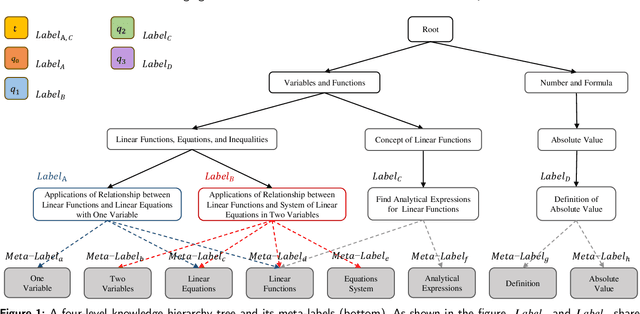
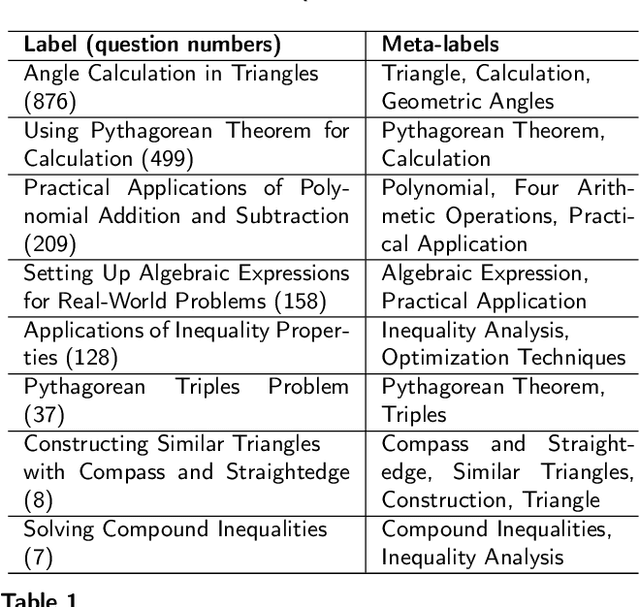
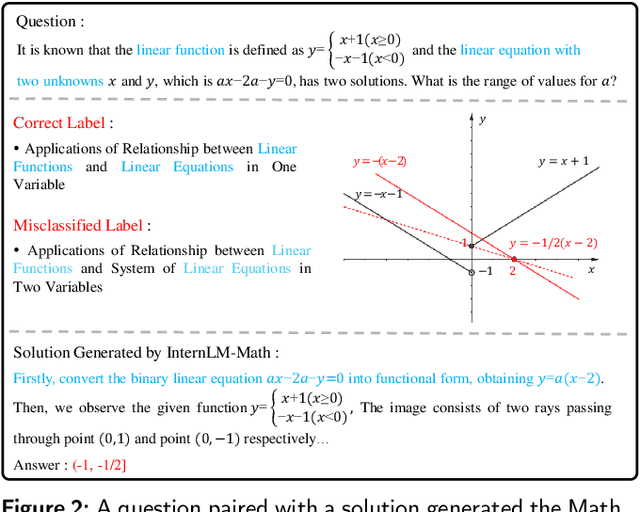
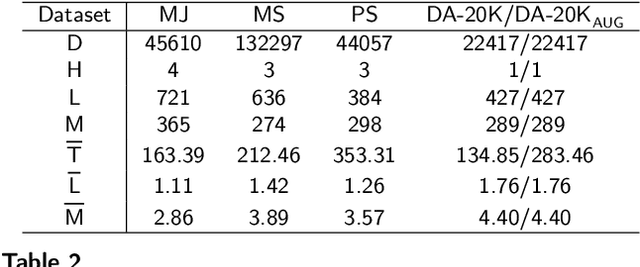
Abstract:Accurate annotation of educational resources is critical in the rapidly advancing field of online education due to the complexity and volume of content. Existing classification methods face challenges with semantic overlap and distribution imbalance of labels in the multi-label context, which impedes effective personalized learning and resource recommendation. This paper introduces RR2QC, a novel Retrieval Reranking method To multi-label Question Classification by leveraging label semantics and meta-label refinement. Firstly, RR2QC leverages semantic relationships within and across label groups to enhance pre-training strategie in multi-label context. Next, a class center learning task is introduced, integrating label texts into downstream training to ensure questions consistently align with label semantics, retrieving the most relevant label sequences. Finally, this method decomposes labels into meta-labels and trains a meta-label classifier to rerank the retrieved label sequences. In doing so, RR2QC enhances the understanding and prediction capability of long-tail labels by learning from meta-labels frequently appearing in other labels. Addtionally, a Math LLM is used to generate solutions for questions, extracting latent information to further refine the model's insights. Experimental results demonstrate that RR2QC outperforms existing classification methods in Precision@k and F1 scores across multiple educational datasets, establishing it as a potent enhancement for online educational content utilization.
Large Language Model Assisted Adversarial Robustness Neural Architecture Search
Jun 08, 2024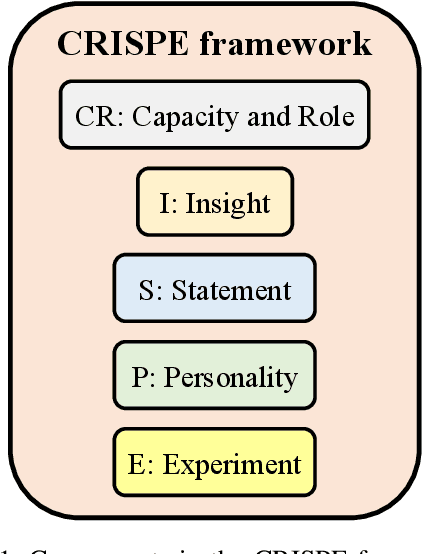
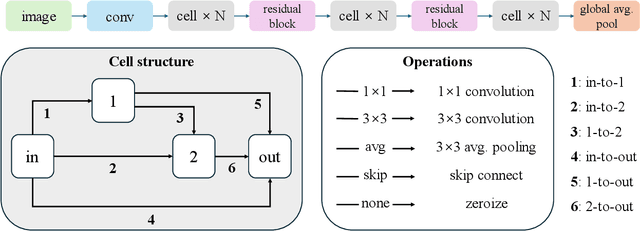

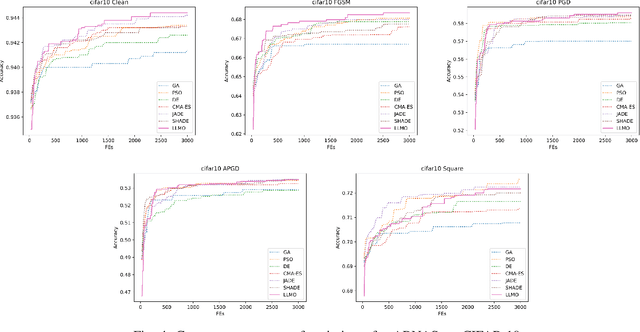
Abstract:Motivated by the potential of large language models (LLMs) as optimizers for solving combinatorial optimization problems, this paper proposes a novel LLM-assisted optimizer (LLMO) to address adversarial robustness neural architecture search (ARNAS), a specific application of combinatorial optimization. We design the prompt using the standard CRISPE framework (i.e., Capacity and Role, Insight, Statement, Personality, and Experiment). In this study, we employ Gemini, a powerful LLM developed by Google. We iteratively refine the prompt, and the responses from Gemini are adapted as solutions to ARNAS instances. Numerical experiments are conducted on NAS-Bench-201-based ARNAS tasks with CIFAR-10 and CIFAR-100 datasets. Six well-known meta-heuristic algorithms (MHAs) including genetic algorithm (GA), particle swarm optimization (PSO), differential evolution (DE), and its variants serve as baselines. The experimental results confirm the competitiveness of the proposed LLMO and highlight the potential of LLMs as effective combinatorial optimizers. The source code of this research can be downloaded from \url{https://github.com/RuiZhong961230/LLMO}.
 Add to Chrome
Add to Chrome Add to Firefox
Add to Firefox Add to Edge
Add to Edge